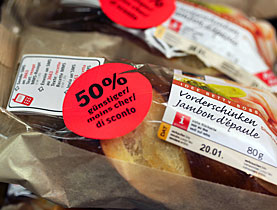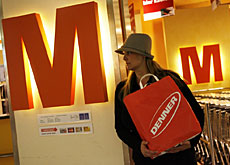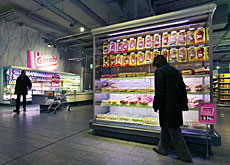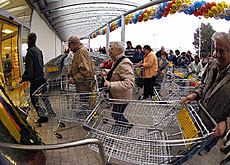Price competition “damaging retailers”

Swiss retailers are shooting themselves in the foot by increasingly reducing the price of goods on the shelves in an effort to undercut each other, a report says.
Shops are undermining profits and failing to bring in new customers, the St Gallen University consumer survey concludes. It advises retailers to concentrate on more innovative products.
Competition in the retail market has increased in the past few years, particularly in the food sector where German discounters have made inroads into the Swiss market.
High street stores are also facing the squeeze from neighbouring countries that attract daytripper Swiss shoppers looking for cheaper prices over the border. It is estimated that the Swiss consumer pays up to 40 per cent more for some groceries than the German shopper.
But the strategy of slashing prices and introducing low cost ranges is not producing the intended results, according to Professor Thomas Rudolph of St Gallen University’s institute of marketing.
“Price reductions generate hardly any new customers as the demand for goods has not increased,” he said. “Therefore the same customers can buy the same amount of goods at a reduced price, and profits sink.”
He added that retailers would profit more from developing “added value” goods that tap into consumers’ emotions, such as the highly successful Nespresso coffee machine. Rudolph had previously maintained that a price war could result in job cuts.
But leading supermarket chain Coop argued that while innovation is important, price competition plays a crucial role in the retail sector.
Little sympathy
“Everyone has special offers, not just here in Switzerland but in other countries too,” Coop spokesman Karl Weisskopf told swissinfo. “Price is only one thing, but you cannot say that it is unimportant.”
“We have to be competitive otherwise we would lose customers and market share. If we all raised our prices to improve our margins then our customers would simply go abroad.”
Coop and main rival Migros – the country’s leading retailer – have both increased the scope of their budget lines in recent years. Coop has increased the number of Prix Garantie (price guarantee) products from 290 to 450 in the past two years. Migros’s M-Budget range has expanded from 154 articles in 2000 to 615 this year.
Supermarkets have also turned their attention to suppliers who they say charge significantly more than in other countries. Two years ago Coop joined forces with other European retailers to form a united buying group that aimed to bring down food producers’ prices.
But the Consumer Protection Association had little sympathy for retailers caught up in a spiralling price war.
“We welcome this competition in the retail sector because it drives down prices for consumers,” spokesman Andreas Tschöpe told swissinfo.
“Supermarkets have been building newer and bigger consumer temples in the past few years so they cannot argue that they do not have enough money to cut prices.”
swissinfo, Matthew Allen with agencies
St Gallen University researchers surveyed over 5,000 consumers in the fields of groceries, furniture, sport equipment, textiles and electronics for their retail survey.
The retail industry contributes 16% to Swiss gross domestic product (SFr75 billion or $68 billion per year) and accounts for every fifth job in the country (881,000), according to a 2006 study by economic research group BAK Basel Economics.
The sector also accounts for around 14% of all apprenticeship places in Switzerland.
The two giants, Migros and Coop, dominate the Swiss retail industry with 30% market share – 70% of the food and drinks sector alone, excluding independent distributors.
Discount supermarkets account for around 5% of Swiss market share compared with 40% in Germany.
The face of the Swiss supermarket scene was changed in 2005 with the arrival of German discount chain Aldi. It is expected to be followed across the border by Lidl in the near future.
The infiltration prompted price reductions from the two main supermarkets, Migros and Coop, who both expanded their budget ranges.
The supermarket sector has also experienced a period of consolidation, culminating at the end of last year with Migros buying a 70% stake in Swiss discounter Denner.
Earlier last year, Coop said it would buy 12 large supermarkets from French giant Carrefour. Denner acquired rival discount chain Pick Pay in 2005.

In compliance with the JTI standards
More: SWI swissinfo.ch certified by the Journalism Trust Initiative




You can find an overview of ongoing debates with our journalists here. Please join us!
If you want to start a conversation about a topic raised in this article or want to report factual errors, email us at english@swissinfo.ch.